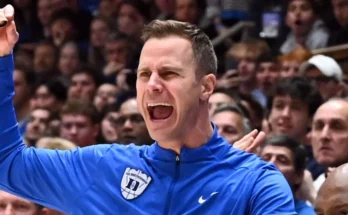In a likely postseason preview, the Kings put up a wall to stop the Oilers, who are without a star.
In a highly anticipated postseason preview, the Los Angeles Kings put on a masterclass in defensive play, successfully neutralizing the offensive firepower of the Edmonton Oilers, who were without their star player. The matchup highlighted the stark contrast between the two teams’ strategies and skill sets, as the Kings employed a suffocating defense to stifle the Oilers’ high-octane offense, leading to a dominant victory.
A Clash of Contrasting Styles
The Kings, known for their gritty, defensively responsible play, have always thrived on a team-first approach that values structure and discipline. On the other hand, the Oilers have been defined by their dynamic duo of Connor McDavid and Leon Draisaitl, with McDavid often carrying the offensive burden and creating havoc with his unparalleled speed and vision. However, with McDavid sidelined due to injury, Edmonton’s offense was without its most dangerous weapon, and the Kings took full advantage of the situation.
From the very first puck drop, Los Angeles established their presence, playing with the kind of urgency and intensity that their coach had emphasized in the lead-up to the game. It was clear that they recognized the Oilers’ vulnerability without McDavid and were eager to exploit it. The Kings’ defensive scheme was tight and disciplined, with every player contributing to a wall of resistance that the Oilers found almost impossible to break.
The Kings’ Defensive Wall
At the heart of the Kings’ defensive success was their ability to limit Edmonton’s opportunities, particularly on the rush. The Oilers are renowned for their speed and skill, relying on quick transitions to create high-quality chances. But the Kings effectively shut down these transitions by clogging the neutral zone and forcing the Oilers to dump the puck in rather than carrying it through. By doing so, they took away Edmonton’s ability to get set up in the offensive zone, where they can wreak havoc with quick puck movement and one-timers.
The Kings’ defensemen, led by seasoned blue-liners, played with incredible poise and physicality. They were quick to close gaps and eliminate time and space for the Oilers’ forwards. Even when Edmonton did manage to get the puck deep, the Kings’ defense was resolute, ensuring that no second-chance opportunities were allowed. Their defense was not just about shutting down plays but also about controlling the tempo of the game, limiting the Oilers’ ability to create sustained offensive pressure.
Moreover, the Kings did an excellent job of forcing the Oilers into the perimeter. Their defensemen maintained tight coverage in front of their net, blocking shooting lanes and forcing shots from low-percentage areas. This forced Edmonton into a more predictable style of play, one that they were unable to adapt to effectively.
Goaltending: A Pillar of Success
A major factor in the Kings’ triumph was their outstanding goaltending. The Kings’ netminder was nothing short of exceptional, providing a steady and reliable backstop throughout the contest. His positioning was flawless, and his ability to track the puck through traffic allowed him to make key saves at critical moments. Whether it was a flurry of shots from the Oilers in the second period or a breakaway chance, the goaltender stood tall, keeping his team in the driver’s seat.
In particular, the Kings’ goaltender demonstrated excellent rebound control, which is crucial when facing a team like the Oilers, who thrive on second-chance opportunities. By controlling rebounds and not allowing Edmonton to create any chaos in front of the net, the Kings were able to keep the pressure off their defense and maintain the game’s flow.
The Oilers’ Struggles Without McDavid
Without Connor McDavid in the lineup, the Oilers were forced to rely more heavily on their secondary scoring and depth players. However, despite having talented players like Leon Draisaitl and Ryan Nugent-Hopkins, Edmonton struggled to generate the kind of offensive creativity they are known for. McDavid’s absence was felt most on the power play, where his ability to create space and deliver pinpoint passes was sorely missed. Without McDavid as a threat to draw defenders’ attention, the Oilers’ power play was much less dangerous, and the Kings were able to kill penalties with relative ease.
Draisaitl, though still a talented offensive force, found it difficult to take over the game in the same way McDavid could. The Kings were able to match him with top-tier defensive pairings, limiting his ability to find space in the offensive zone. The lack of a true game-breaking talent left the Oilers looking disjointed, with many of their attempts coming from the outside or getting blocked by the Kings’ defense.
Additionally, the Oilers’ depth players, who are often overshadowed by the brilliance of McDavid and Draisaitl, struggled to step up in the absence of their superstar. Players like Zach Hyman and Kailer Yamamoto failed to generate much offensive pressure, and the Kings’ defense did an excellent job of isolating the Oilers’ lesser-known players, forcing them into difficult situations.
The Kings’ Offensive Opportunities
While the game was dominated by defensive play, the Kings were not without their own offensive chances. They took full advantage of the Oilers’ weaknesses and managed to capitalize on key moments. The Kings’ offense was opportunistic, waiting for Edmonton’s mistakes and pouncing when given the chance. Their forecheck was aggressive, forcing turnovers and creating odd-man rushes. When the Oilers failed to clear the puck or made ill-advised passes, the Kings capitalized, taking shots from high-danger areas.
One of the defining moments of the game came in the second period, when the Kings scored the game’s first goal off a turnover deep in the Oilers’ zone. The Kings’ forward line pressured Edmonton’s defensemen, and when an errant pass went straight to a Kings winger, he fired a shot that beat the Oilers’ goalie cleanly. This goal set the tone for the remainder of the game, and the Oilers were never able to recover.
The Kings also displayed a strong commitment to team play, with several players contributing to their offensive output. While they didn’t rack up an enormous number of shots, their scoring chances were high quality. Their ability to execute plays and take advantage of Edmonton’s mistakes demonstrated the Kings’ growing confidence as a well-rounded team, capable of both defending and attacking efficiently.
Special Teams: Kings’ Dominance
In a game where every advantage mattered, the Kings excelled on special teams. Their penalty kill was outstanding, constantly pressuring the Oilers and preventing them from setting up in the zone. The Kings’ aggressive penalty kill disrupted the Oilers’ rhythm and stifled their usually lethal power play. On the other side, the Kings’ power play took advantage of the Oilers’ defensive lapses and capitalized when opportunities arose. While not as potent as their penalty kill, the Kings managed to convert when they had the man advantage, further sealing their dominance.
The Bigger Picture: A Postseason Preview
This game was more than just a regular-season matchup—it served as a valuable postseason preview. The Kings showcased exactly what they are capable of when they execute their game plan to perfection. Their ability to stifle a high-powered offense like the Oilers without their superstar is a testament to their defensive prowess and commitment to team play. If they can maintain this level of discipline and intensity throughout the postseason, the Kings will be a difficult team for any opponent to face.
On the other hand, the Oilers’ struggles without McDavid should raise concerns about their ability to perform in the postseason without their captain. While the Oilers have plenty of talent, the absence of McDavid exposes their lack of depth and highlights just how reliant they are on his brilliance. If McDavid remains sidelined or is limited in any way, Edmonton’s road to the playoffs could become much more challenging.
In this postseason preview, the Los Angeles Kings demonstrated that they are a team built for playoff success. Their suffocating defense, excellent goaltending, and ability to capitalize on opportunities were all on full display as they stopped the Edmonton Oilers in their tracks. The Oilers, meanwhile, will need to find a way to remain competitive without McDavid if they are to make a deep postseason run. The Kings’ performance in this game served as a reminder that in the playoffs, defense and team play often win championships—something the Oilers will need to improve if they hope to contend for the ultimate prize.



